Elon Musk Accused of Serial Fraud By the U.S. Gaming Community in Confirmation That There Is Nothing He Won’t Lie About
Covert account-sharing or -boosting, which gamers say Musk is doing, is a grave offense in gaming—especially if one claims to be an expert gamer. But what it says about the incoming co-POTUS is worse.
To receive free, unrestricted access to this publication’s 475+ exclusive reports for seven days, just click the red “free trial offer” button below. You can cancel your subscription at any time.
Introduction
In a little-noticed online exchange with his good friend Andrew Tate—the notorious alleged Rapist and Sex Trafficker and hardcore “violent” misogynist—self-styled anti-sexual-violence crusader Elon Musk, who’s also described notorious alleged Rapist and Sex Trafficker Diddy as a “good friend” and is about to be the co-President of the United States with an adjudicated rapist and serial sexual predator (Donald Trump), made a telling remark about his ability to distinguish between money other people have worked to earn within his ambit and money he himself has been compelled to pay.
Speaking of “free speech” (as he pathologically misunderstands the term) on Twitter, Musk said to Tate that while people can “insult him at will” on Twitter without any consequence—a flatly untrue claim, as he’s repeatedly banned accounts whose owners displeased him by exercising what he’d call “free speech” (see, e.g., here, here, here, here, and here)—where he draws the line is in “paying” his critics to criticize him.
It would have been understandable if anyone observing this exchange immediately scratched their head. Who on Earth is asking Elon Musk to pay them to use Twitter?
{Note: Without wasting much digital ink on this, the basis for the would-be axing of Musk from MAGAdom relates to his support for Big Tech systematically abusing H-1B visas, which studies confirm they do. The upshot is that Musk and his billionaire friends in tech fire tens of thousands of highly qualified middle-class American workers annually so they can hire and wildly underpay anxious foreign workers who must do as they’re told no matter what it is—including never form a union—or else Musk and company will deport them. Readers are reminded that Musk himself was an illegal immigrant to the United States in the 1990s and is only someone we have heard of today because he was not deported when he should have been. This fact makes exchanges like the one below, from just the last 24 hours, positively obscene, as applying UK MP Rupert Lowe’s works to Musk’s 1990s immigration status, Musk “came [to America] and broke the conditions of his visa” but very much didn’t “expect to be deported.”}
A quick dive into Musk’s recent anti-free speech hijinks on Twitter reveals that he is referring to a slew of far-right domestic extremists whose feeds he lately demonetized as punishment for their attempts to excommunicate him from the MAGA movement.
The loudest example of a recent brouhaha between Musk and the MAGA movement he wants Trump supporters to forget he only joined a few months ago—and only to advance his own geopolitical ambitions—was his demonetization of Laura Loomer.
Readers will recall Loomer as a 9/11 Truther, proud Islamophobe, and Trump advisor who has at times also been a rumored Trump girlfriend; Trump tossed her to the curb, as he often does loyalists, when the relationship led to bad press for him—something he can’t abide, no matter whose previously acknowledged years of service to him must now be summarily memory-holed.
The claim Musk now makes to Tate about Loomer is that when a MAGA influencer has Subscriptions enabled on Twitter, that means he’s paying the influencer. With this view of how his own product (Subscriptions) works in mind, Musk opines that he should not be expected to open his wallet to pay people who criticize him online.
The problem is that this is not in any sense how Subscriptions work on Twitter.
Indeed, it’s not how content creation at any level works on the internet.
Here’s how subscriptions work on Twitter and everywhere else: internet users pay a content creator like Loomer a monthly or annual subscription fee in recognition of her work—such as it is—and what Elon Musk (or any owner of a digital platform with subscriptions enabled) does is take a sizable cut of Ms. Loomer’s profits without doing any work whatsoever himself. Indeed, it’s Musk who is getting paid by his critics, rather than the other way around. And the chance that Musk misunderstands this is precisely zero.
Both Musk’s rhetorical sleight-of-hand here and the fact that he wasn’t called on it by his legions of fans underscores a critical point: not only is Musk a pathological liar and Twitter a breeding ground for “Elongelicals” unwilling to call out even his most obvious misstatements—misstatements, in fact, that they in particular have cause to know are false—but his highly fraught and emotional relationship with money causes him to instinctively dissemble about certain financial transactions if he doesn’t like what their contours say about him, his values, and his abilities. This betrays a sort of anxiety about how he gets his money, and also what the way he gets it says about him.
Elon Musk doesn’t like the fact that Twitter users who presumably admire him also admire Laura Loomer and pay her for her work—nor does he wish to admit that he profits from Loomer’s work despite contributing nothing to it whatsoever. Nor is he willing to be called out for demonetizing her over her speech. So he invents a made-up, counterfactual “principle” that his demonetization is said to be in service of: the preposterous idea that if he allows Loomer to monetize her Twitter feed, he himself is funding her.
Why do this?
Because Musk can’t just admit that he wants to hurt Loomer financially because she’s a critic of his.
By the same token, Musk has been tampering with the Twitter algorithm to harm progressive critics of his for years now—critics who don’t use Subscriptions, but whose reach on Twitter does help determine the audience for their off-site paid products—but this too is something he can’t admit or speak about, because it’s not a thing a free-speech “absolutist” (as he calls himself) would ever even think to do.
Indeed, Musk is still throttling and kettling all Substack links on Twitter over a fight he had with the site’s owners nearly two years ago.
All this is tied to the larger fact that, as Proof reported months ago, Elon Musk’s father Errol Musk has confirmed that his son has been hiding his far-right politics for many, many years—even decades. Musk simply refuses to cop to who and what he is in public for the reason that he believes it won’t play well and will cost him money. So when he’s caught throttling and kettling Substack links because Substack is a competitor of his and he’s angry (at that moment) at one of Substack’s superstars, Matt Taibbi, he claims falsely that Substack is stealing his intellectual property and then falsely claims no Substack links are being tampered with, when anyone can see that’s not true. Or when he flees South Africa to go to Canada and then America and worries his hard-right politics won’t play well in the then-left-leaning Silicon Valley, he pretends to be a centrist or even a center-leftist. Or when he steals income from a major critic of his, he must immediately produce a byzantine excuse intended to make him seem noble or (at a minimum) human.
All of these are indicators—along with his own repeated confessions on this score—that Elon Musk is mentally ill, which doesn’t in any sense discredit him but which does mean, given that he is our incoming co-POTUS, Americans should care about whether he’s being properly treated for his illnesses. And all the evidence we have confirms that he’s not. That’s now a national security issue for the entire country.
The foregoing is a necessary prelude to understanding the larger significance of a seemingly esoteric new Musk scandal that actually underscores everything already discussed above: Musk’s pathological deceit; his penchant for fraud; his lingering mental health issues; his bizarre exhibition of feelings of invulnerability; his deep lack of respect for anyone else’s intelligence; and his persistent oddness about certain types of financial transactions he is unwilling to admit being part of. In this case, what he is lying about is an apparent financial relationship he has with one or more anonymous video-game “grinders” whose thankless job it is to secretly expend their professional efforts to a) directly make Musk look good, b) indirectly make him money via good PR.
{Note: Worth remembering, as this scandal unfolds, is that Musk will not only be co-running the United States as he manages all of the executive functions Trump has devolved to DOGE, but he also runs a huge network of companies that could soon—shockingly—include TikTok.}
Sidebar: More From Andrew Tate, the Sort of “Man” Who Elon Musk Amplifies, Supports, and Is Friends With on Twitter These Days
It will seem impossible, but all of these deranged tweets are from just the last 24 hours. Nor is this a full accounting of the deranged tweets Tate has posted over this period.
Elon Musk’s Longstanding Reputation As a Talented Video Game Player Comes in For Significant Scrutiny
So when does a man who runs six companies—if not well—and also manages a massive self-dealing non-profit foundation that violates the law annually with its insufficient charitable giving find the time to become the top Diablo IV player in the world and the #12 Path of Exile 2 player in the world?
Perhaps, it turns out, he doesn’t.
To be sure, Elon Musk is very concerned that he be seen as one of the best videogame players in the world, an achievement that would normally take ten to sixteen hours of gaming daily to achieve and would generally be seen as impossible for anyone who has another full-time job to attain—let alone seven full-time jobs.
And none of those seven jobs, by the way, include the job he’s about to ascend to on January 20, 2025: co-President of the United States.
We know Musk wants—perhaps even needs, in some corner of his psyche—to be seen as unmatched in some of the most popular ultra-violent video games on Earth because his standing in the two games named above is one that Musk himself repeatedly boasts about online. Also in interviews. Also on podcasts. Also on camera. Also in private conversations. This isn’t a low-key gamer who’s abashedly been found out as talented, this is Earth’s richest and most powerful man using the world’s largest megaphone to declare, over and over again, that he is better at video games than almost anyone else.
And how does such a declaration by a man so rich, so famous, and so influential make teens and young adults who don’t have nearly his financial success but have dreamt of being in the top tier of Diablo IV and Path of Exile 2 players feel?
Not too good, one imagines.
One imagines they feel like a man who’s already set himself well above them is now lording over them the fact that even in their chosen sphere they’re just no match for him.
And what do these young people—most of them men and many of them nominal Elon Musk fans—think about him and his achievements, now that the general consensus in the gaming community is that they’re a scam?
One guesses these lovers of ultra-violent gaming are suddenly seeing red in real life.
The Billionaire Edgelord-Gamer
Elon Musk hasn’t exactly hidden that he’s a lonely, socially awkward man who seeks to build parasocial relationships online and is particularly interested in doing so in those spheres where toxic masculinity prevails: from the Ultimate Fighting Championship to the tricking out of electric vehicles in covers and paint jobs that make them a grave danger to everyone on the road and in some cases possibly illegal, from gleefully firing off heavy weapons on video to cozying up to the scariest mass murders the world over, from dispensing racist and sexist memes on social media to, yes, killing huge hordes of digital baddies in games whose fans probably have at least some overlap with the hordes of real-life baddies who were behind the ultra-misogynistic Gamergate scandal.
{Note: No one can explain what political virtue-signaling the pro-January-6-pardon Musk was going for here, given his very well-known love of graphic, unlimited violence in video games.}
But it’s more than just loneliness, nerdiness, and a subtle fascination with violence.
Musk has been invested in mythos—and in self-mythologizing—his entire life. He is obsessed with the idea that he’s a Tony Stark-like superhero of some kind (even if some would now call him a supervillain) and seems to think of the world in terms of the fantasy trade paperbacks and Dungeons & Dragons campaigns he loved as a kid.
In other words, if he can convince right-leaning young men en masse that he’s such a capable human that he can run at least seven companies, and the United States, and be a father to twelve children, and still have time left over to (someone will have to do the math for me on this) simultaneously shitpost online all day and game online all day…
…well, he does start to seem a bit like the sort of “alpha male” who might impress the very demographic Elon needs for a customer base, a voter base, a base for his many parasocial relationships, and even his extremely fragile sense of self as a man (which is reportedly defined by his relationship with, and need for approval from, his toxic dad).
But what if a major component of this self-proclaimed mystique is simply bullshit?
Would that be at least an indication—spoiler alert, by the laws of common sense, this must be so—that the carefully crafted public persona Musk has honed over decades might also be fake, precisely as Proof has been reporting for two years now (albeit in focusing on how Mr. Musk’s self-declaration as a centrist was all part of a long con)?
The Allegations
First, it’s really important to understand that becoming as good at just one of the two video games listed above as Elon Musk claims to have become is truly a full-time job.
And not just a full-time job, but a full-time job only someone with enormous native talent could succeed at to the degree Musk claims he has.
That Musk claims to have achieved this feat twice over—with two separate games in the limited pantheon of games young men today most want to excel in—and that he has insisted on recording and publishing video of himself playing these games as a means of convincing his fellow gamers that he’s not a fraud is…
…well, as it looks right now, something beyond “the height of gall.” It’s downright weird.
It earnestly seems like—and I say this as someone who’s been pals with pathological liars and studied them as a political historian and worked closely with them as a city public defender—it’s something only a pathological liar would ever dare to attempt.
Many people don’t realize that a big element of being a pathological liar isn’t just the pretense of bravado but the reality of it. Pathological liars may never have done even a tenth of what they say they have, and they may only be one-one-hundredth as brave as their stories would make them out to be, but there is actually a shocking audacity (not quite the same thing as bravery) in the risks a pathological liar will take to convince his marks he’s for real.
In the same way we sometimes observe that young people often die needlessly doing physical stunts for the internet because young people often seem to think themselves invulnerable and deathless, a pathological liar—particularly one who, like Elon Musk, is also a malignant narcissistic sociopath—is going to take risks to try to “prove” one of their lies is true that aren’t just unwise or irrational but arguably deranged.
Indeed, it was in the midst of one such stunt that Musk got caught out as an old man trying to defraud a community of (as he sees them) cool youngsters he’s been trying to impress for years. As respected industry pub PC Gamer outlined in its report on this:
“Path of Exile 2 streamers and subreddit sleuths [have] analyze[d] a recent stream in which Musk seemed to fumble over basic gameplay mechanics [in Path of Exile 2].
On January 7, he streamed an hour and a half of Path of Exile 2 gameplay on his current level 95 hardcore character. In ‘PoE 2,’ surviving into higher levels in the hardcore league, regardless of ladder placement, is an impressive feat: as you progress, the game stacks layers of enemy modifiers, damage resistance reductions and hazardous tileset modifiers, and dying once in hardcore means your character is toast.
Getting a hardcore character into the 80s is impressive; getting one high enough into the 90s to place high on the hardcore ladder is a feat of skilled gameplay and buildcraft. [But Musk’s] gameplay, as on display in viewer-recorded VODs of the stream, is…well, not that.”
As the media outlet explains, Musk’s screen showed everyone viewing his playing at home clear “indicator[s] that, perhaps, another individual had curated” his gaming experience before Musk logged on. And his supposedly lightning-fast “clearspeed”—the speed with which the gamer defeats certain obstacles—was actually “halting,” to the point that his ability to even move his character on-screen “at times seems random.”
PC Gamer reported that Musk makes errors that no one with any experience with the game would make, like failing to replenish in a timely fashion empty meters that in effect determine a character’s immediate odds of survival and “leaving valuable items…uncollected on the ground [while] pick[ing] up low-tier [items] that would be irrelevant at his character’s level of progression.” At times, the outlet records, clearly astonished, “Musk clicks impotently at nodes on his map, seemingly struggling to identify which he can actually [enter] despite having theoretically cleared the hundreds—if not thousands—of maps necessary for his character's level and gear.”
In short, a man claiming to be one of the best in the world at what he does appears to have little skill at the task in question.
We’d better hope that’s not a metaphor for the chops of America’s rocketry “pioneer.”
Or its EV—including supposed, so-called “full self driving”—“pioneer.”
Or the man who says he’s revolutionizing AI, transit, robotics, and bioengineering.
Apparently the stream that Musk intended as a showcase of his talents got even worse from there. Despite his character having “a full inventory, [he would] repeatedly attempts to pick up items without inventory space”; on occasion he seemed to be “manually sorting” his inventory items, something that a top player simply cannot do because “it would imply he’d manually sorted through thousands of dropped items to assemble his character's equipment, which could very well have taken longer than the actual gameplay necessary to reach his current level”; and even “seemed to show a fundamental misunderstanding of how itemization in Path of Exile 2 works.”
This would be like a plumber looking at a pipe under your sink and exclaiming, “I don’t know what I’m looking at, here.”
As a longtime gamer and video game critic-cum-historian myself (I run a whole top-ranked substack dedicated in significant part to video games) I can report here that inventory management skills are central to the gameplay of the sort of games that Musk claims to be a world leader in. They’re not optional—and not having them unambiguously means you don’t know how to play a game in this subgenre properly.
The predictable result of all this, during and after the disastrous Path of Exile 2 stream, were experienced gamers en masse declaring it impossible—not just unlikely—that Musk had single-handedly created the “hardcore,” high-level character he had repeatedly implied he had manifested exclusively through his own manual labors.
Said one gamer, “His gear is better than a lot of full time streamers. No way it is real. Account-sharing or boost[ing] of some kind.” Another said, “I mean he has a fucking ‘mirror-tier’ staff but says he ‘needs to replace it because it’s only level 62.’ You don’t need to say anything else [about Musk’s knowledge of Path of Exile 2 to confirm he’s a fraud].” A third viewer opined, “The weird part to me is that he feels he needs to brag about being a pro gamer for some reason. Dude put a car his company designed into space on a rocket his other company designed, [so] why the hell does he need to brag about gaming?”
Ironically, Proof just published a novella-length report on this very question.
The overarching question of why Elon Musk so needs to be accepted in the gaming community, and why he’s taken breathtaking risks to frame himself as things he is not, are also discussed over the last twenty biographical reports on Elon Musk in the “Elon Musk Section” of this publication.
To be clear, it’s not just PC Gamer crying foul, either. Or a few gamers on Reddit.
This is now a full-blown crisis for Musk, with reports on his alleged fraud in Forbes (link), Rolling Stone (link), Barstool Sports (link), Windows Central (link), Mundo Deportivo (link), Fortune (link) and, perhaps most devastatingly, VICE (link). This is just the tip of the iceberg, too; it’d be possible to list many more such takedowns, all from just the past week. And the headlines! Just take a look at this one:
A Persistent Trend of Fraud and Disinformation
But perhaps Musk is a great Diablo IV player, and was only lying about Path of Exile 2?
Alas, no—that doesn’t appear to be the case, either.
As we turn our attention (and the gaming world “re-turns” its attention) to the alleged gaming feats that first vaulted Musk into the pinnacle of the pro gaming community, the questions now getting asked are becoming more strident and concerning—to the point that they really do call into question whether Musk is legitimately “going mad.”
TechCrunch reports that pro gamers who specialize in Diablo IV “can’t fathom how six-time CEO Elon Musk found the time to best Diablo IV,” adding that after Musk appeared to defeat the highest level of the whole game (“The Pit”) in just two minutes (emphasis supplied),
A top player told the Wall Street Journal that besting The Pit should have involved all-day play. If Musk didn’t play all day, speculation ranged that he could have used a known glitch or somehow bought advantages, the Journal reported.
Turning to the Wall Street Journal report in question, we find Musk “declaring himself one of the world’s best players of Diablo IV” even as other confirmed top players say that “Musk making his way to the top level [Level 150] in 45 days or less” would have required him playing the game “all day, every day” for a month and a half—which he clearly didn’t do, given major-media reporting on his public movements and schedule.
Would Musk be willing to play video games all day, every day for a month and a half if he could (though he can’t)? Sure.
There’s no question Musk is fond of video games; that he plays them obsessively; even that he has some skill at playing them. At various points his biographers have reported him playing the games Quake and Elden Ring obsessively in addition to what is clearly a certain amount of time playing Diablo IV and Path of Exile 2. He’s known to interact with players of these games online in ways that suggest he’s not unfamiliar with them.
But only up to a point.
A man who’s demonstrably on Twitter all day long cannot also be playing video games all day. A man who is spotted by journalists going to meetings and often traveling to those meetings in ways not conducive to video game play isn’t playing video games all day. A man running at least seven institutions isn’t also playing video games all day.
And—it must be said—the richest man on Earth does have the money to get someone else to play for him, and the world’s leading disinformation agent certainly has a track record that suggests he’s willing to lie to anyone at any time about anything and for any reason. Indeed, there’s evidence that Musk takes great delight in lying to people.
While gamers are ever so slightly more convinced by Musk’s somewhat older Diablo IV gameplay than his newer—think mid-2024-presidential-campaign—Path of Exile 2 gameplay, the latter of which seems instantly dubious given that Americans have a strong sense of how Mr. Musk has spent his time over the last six months, the Journal still holds that while a two-minute Pit clearance time is possible for a decent but not top-tier gamer because (a) “it’s possible to run through it over and over,” it’s also true that (b) Musk could have “paid someone to ‘grind’ his or her way to the top on Musk’s behalf” so Musk could start playing the game at its highest level, and (c) his “quick ascension in Diablo IV may have been partly due to a glitch that Blizzard [the game’s developer] inadvertently introduced in October, giving players a way to obtain more power than they’d normally have.”
As perhaps the most famous patron of Blizzard’s games in the world, one can hardly doubt Musk could have had a direct line to company developers if ever he’d wanted it.
But frankly, even taking into account some possible loopholes, most aren’t convinced.
The Fallout Continues
And now there are even new questions about Elon Musk’s past gaming achievements.
Musk has declared himself an all-time great Quake player, but one of the top players of that game saw him at his peak and said he “wasn’t very good,” per PC Gamer.
Other media outlets have reported the same.
Other gamers say that Musk was indeed very good at Quake, but not as good as he says.
All of that notwithstanding, the bigger issue is this one: what’s Musk’s endgame here?
One troubling sign of where all this is headed came from an unlikely source: a public statement by Musk about his bioengineering firm Neuralink, which has already been plagued by federal investigations over its dubious ethics. Now Musk is claiming that Neuralink’s brainchip patients “will soon ‘outperform a pro gamer.’”
Uh oh.
Why is Musk focused on using gaming performance to gauge company performance?
For the moment it is Musk himself who has been claiming, near-daily, to be capable of “outperforming pro gamers,” but it appears those claims are fake, a hoax, a scam, wildly exaggerated, or else somehow misleading. And if Musk is willing to lie about how well he’s playing a video game—with all the potential professional and personal fallout that could come with such a lie, but also with virtually nothing to really gain from risking such a big lie—how much more likely would it be that he would fake test results at Neuralink to make it seem someone who isn’t so good at a given video game is really one of its best players?
That is, how much more willing to lie would Musk be if he stood to gain many billions of dollars in contracts and investments by fraudulently framing a Neuralink customer as a top gamer?
Conclusion
Cheating at video games is bad. Lying to people you’re trying to make friends with is bad—and sad. Exhibiting apparently unlimited gall in trying to convince strangers of something that you know is untrue is… creepy. Also, bad and sad.
But we can agree, too, that the question of whether Elon Musk is a video-game fraud is very low-stakes.
It doesn’t really matter.
What would matter is if Elon Musk, who’s about to become co-President of the United States, is having a mental breakdown.
It would matter, candidly, even if his nerves were “merely” fraying to the point that he has started making colossally bad decisions in his personal life that could manifest as terrible policy decisions in his new role as co-POTUS. No one gets hurt (much) if Elon Musk cheats at Diablo IV; but if Musk makes a bad call about where to direct Trump to send emergency resources, and does so in part because he’s gone transiently batty from stress and anxiety and depression and ketamine use and public calumny and his excessive isolation and any third-party threats against his life and—you get the picture—people could actually die. And since no voters actually elected Musk to anything, the notion that his judgment is in some way and for some reason impaired is a notion no one in major media has vetted and American voters were never given an opportunity to weigh in on.
And that is not okay.
We know that some of Elon Musk’s employees almost called the San Francisco Police Department to do a wellness check on Musk in 2022; they worried he was going to kill himself. Musk has spoken of experiencing anxiety and/or depression and trying out various medications to alleviate those mental health conditions. Musk has implied he might be autistic, which of course is not a mental illness but can certainly make one’s life more stressful when one is constantly in the public eye, has been self-tasked with completing extremely high-level tasks under the gaze of other people, and is forced into numberless socially awkward and geopolitically novel scenarios.
On top of all this, Musk uses ketamine, an experimental drug that may not work, on a timeline that he and not his doctor decides—per his own public statements about not taking it on a strict schedule—and has been reported to be a user of illegal drugs, too.
His daily behavior online is absolutely unhinged and manic, and even those who care about him (including his father and his ex-girlfriend Grimes, the mother of three of his children) say that in recent months his personality has changed irrevocably in a way that is scary. Certainly we know that Mr. Musk is a child of divorce who lived for years with an abusive father and was bullied as a child and has flamed out of every educational program he’s ever been in; we know he used to get into serious fist-fights with his brother Kimbal in front of employees when the two were starting up Zip2, and we know he’s discussed with those close to him suffering from crippling stress.
We know he’s neuroatypical; we know he’s lonely; we know he’s repeatedly engaged in bizarre antisocial acts like offering a horse for a handjob or begging an employee to let him impregnate her or absconding with at least one of his kids for months without letting him see his mom or running an illegal nightclub in college or calling a man who was heroically trying to save endangered children in Thailand a “pedo guy” for no reason whatsoever or regularly consorting with sexual deviants and sex criminals.
There is eccentric, and there’s something beyond that. All the public evidence places Elon Musk somewhere beyond that “something beyond that.” Indeed, the very fact that Musk’s apparent lies about his gaming prowess seem to be par for the course for him is exactly the problem. America has become numb to the ways in which Musk appears to be a danger to himself and those around him—culminating in what have certainly looked like attempts to stoke racial violence in the United Kingdom over the last few weeks.
In view of all this, a video game scandal—of all things—could very easily be dismissed by the average news consumer as rather besides the point when it comes to Elon Musk.
But what if the very audacity, eeriness, and self-destructiveness of this seemingly esoteric scandal is telling us things about who Elon Musk is at his core that we desperately need to know, now that he’s going to be running the entire United States?
Coda
If you want to read more about our incoming co-presidents cheating at competitive events in ways that reveal their moral depravity and even potential mental illness, you can read a book about Trump cheating at golf and what it tells us about him or reports on that subject (among many other places) here, here, here, here, here, here, here, here, here, here, here, here, here, here, here, here, here, here, here, here, here, here and here.



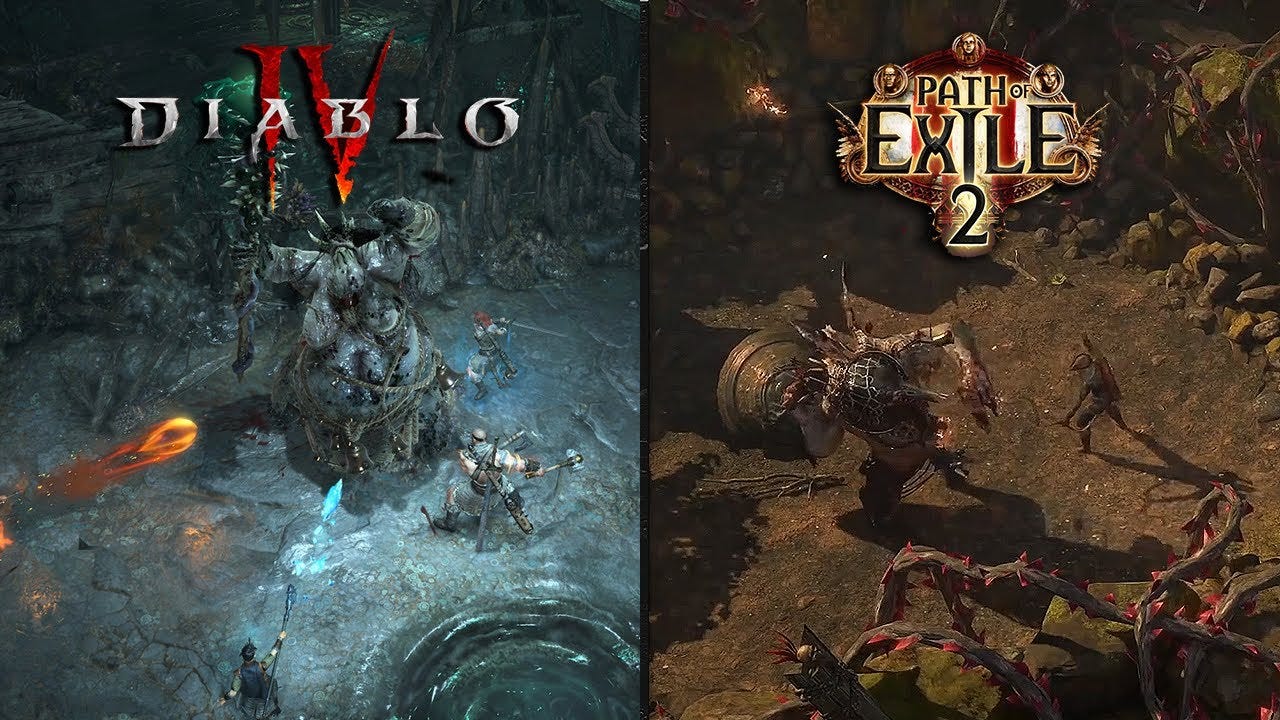
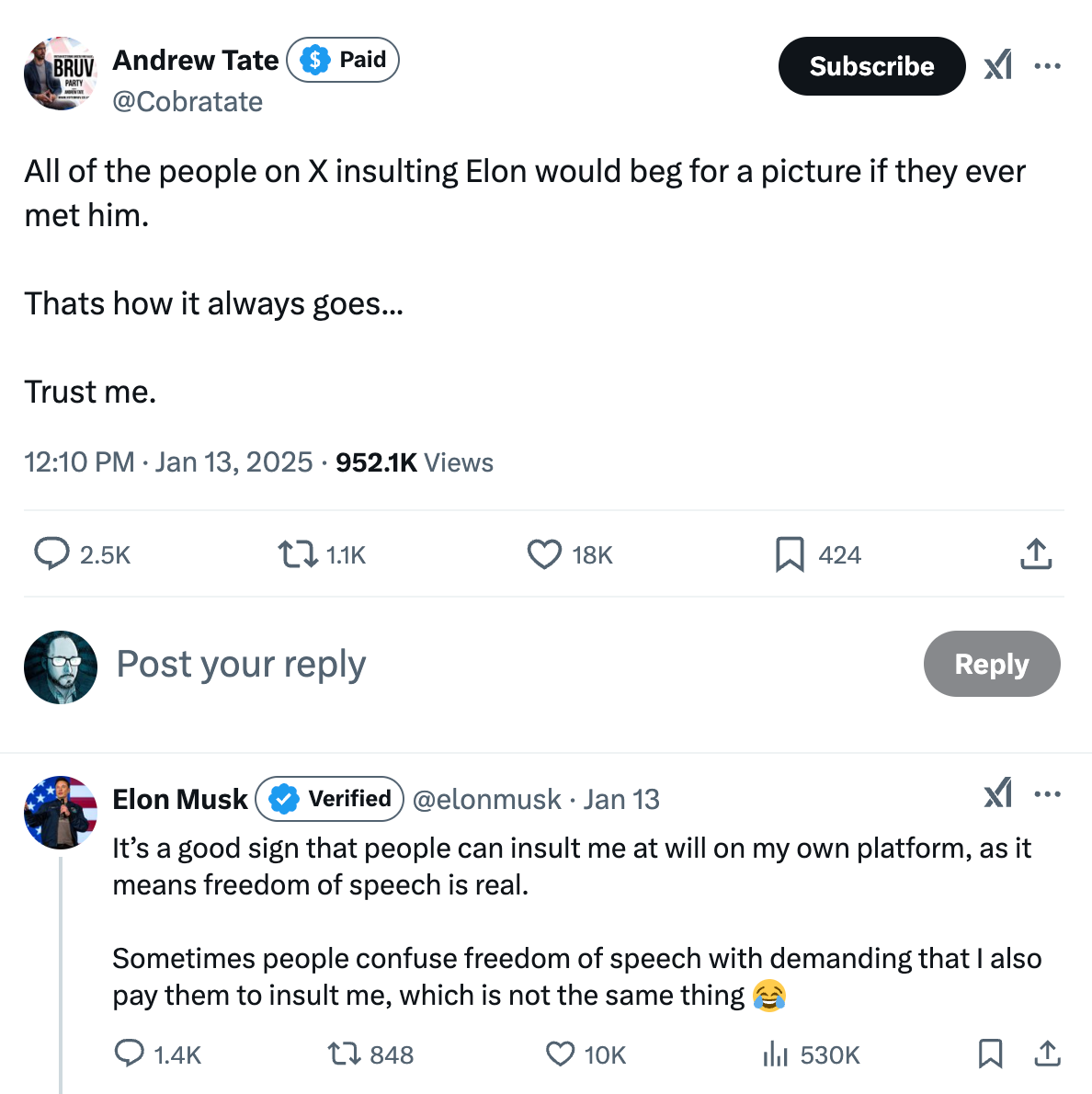
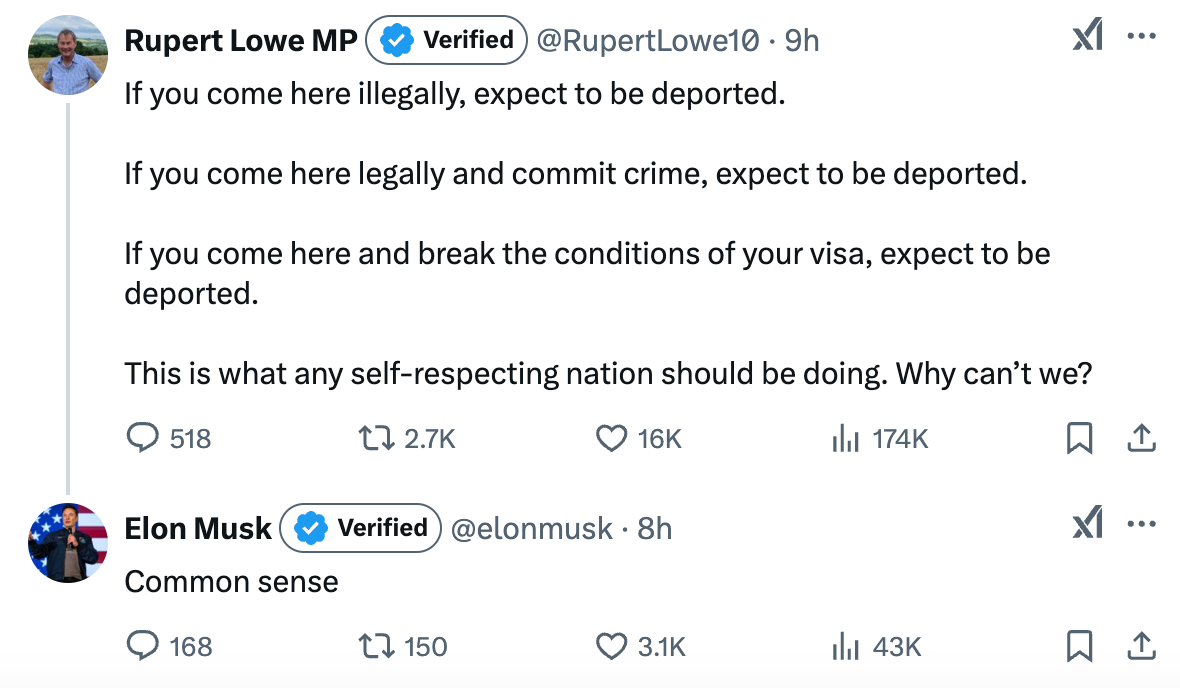
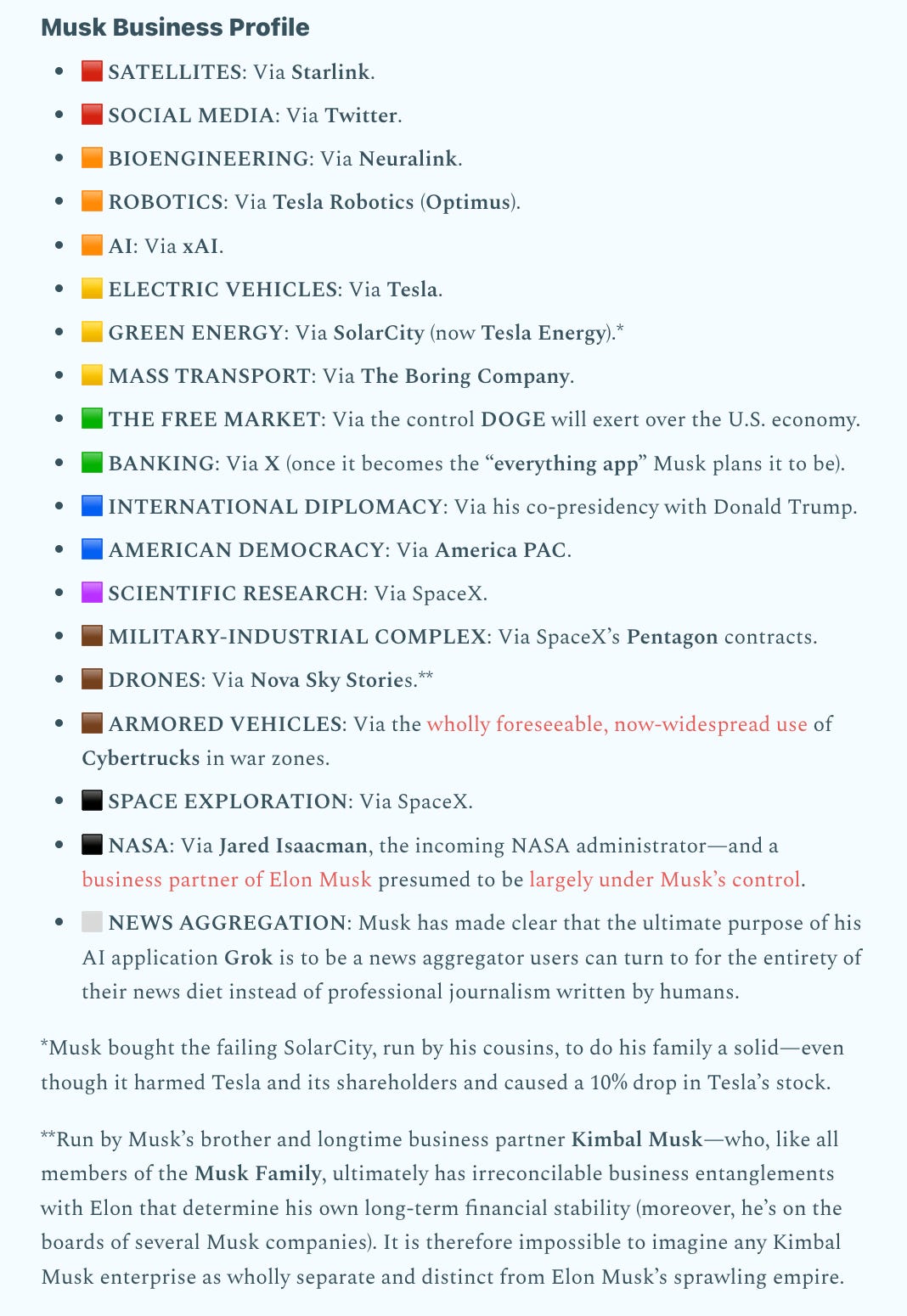
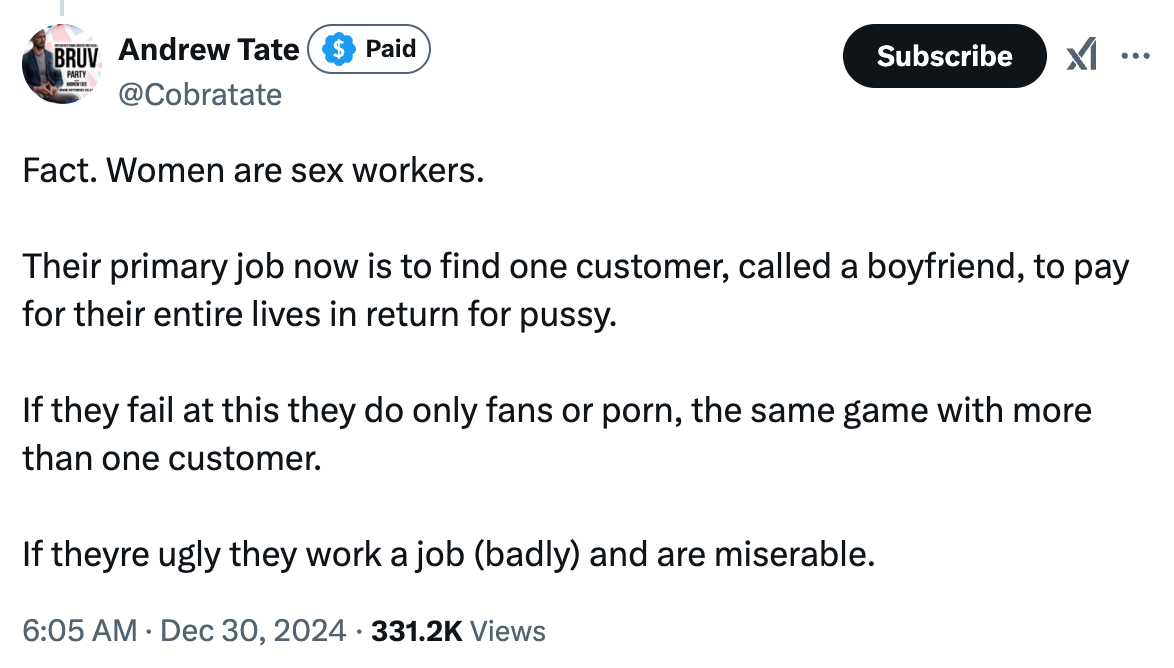

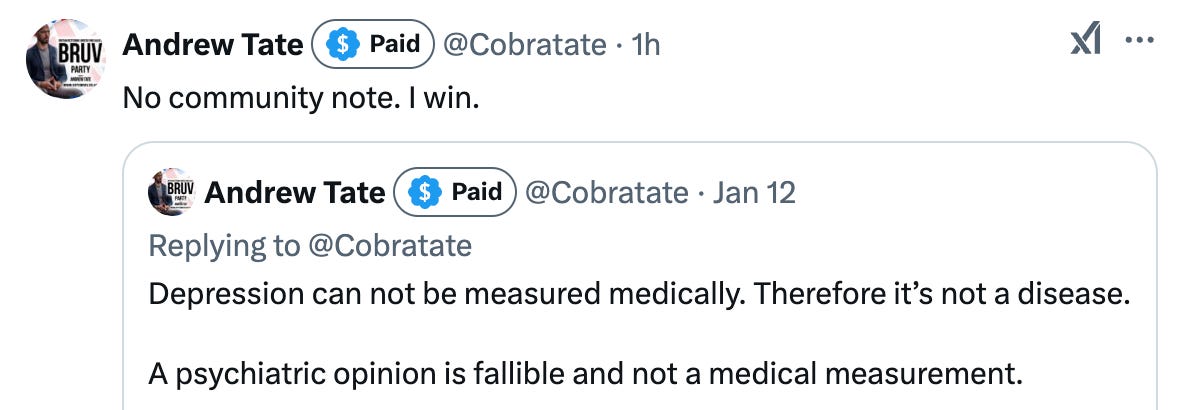


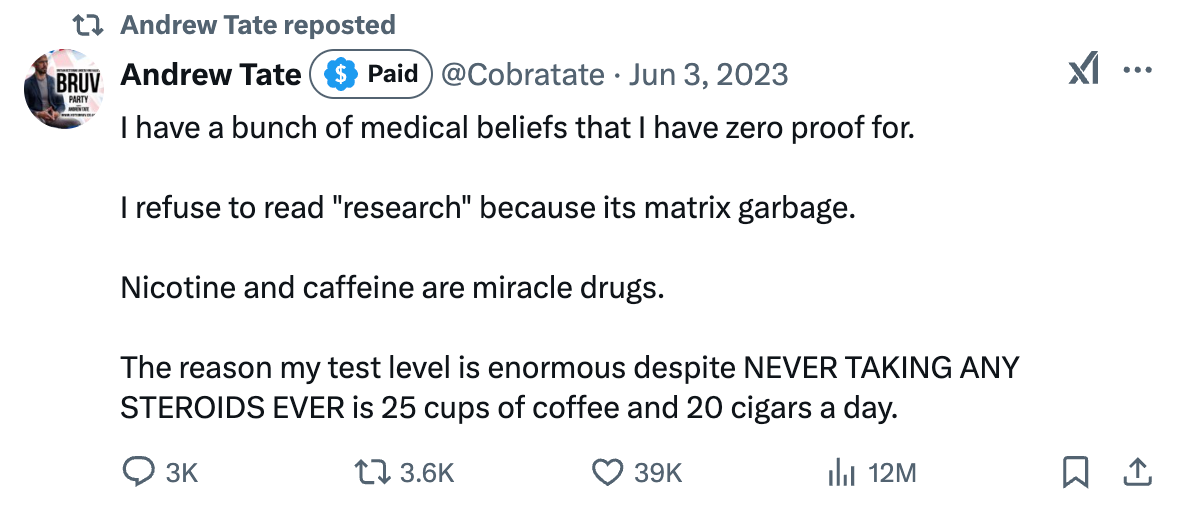

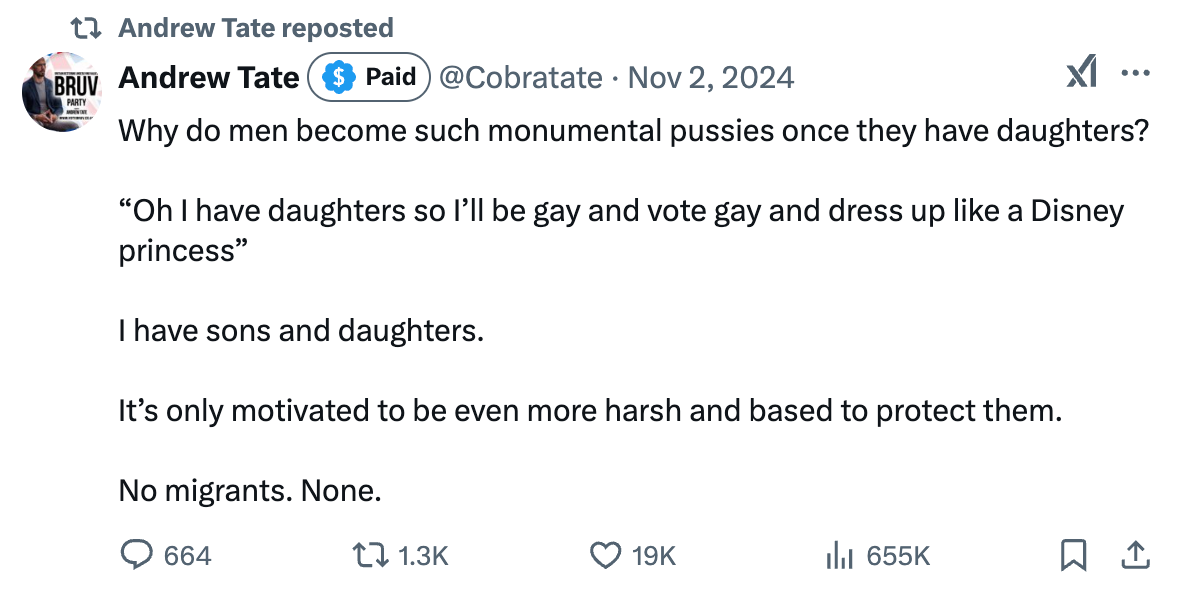
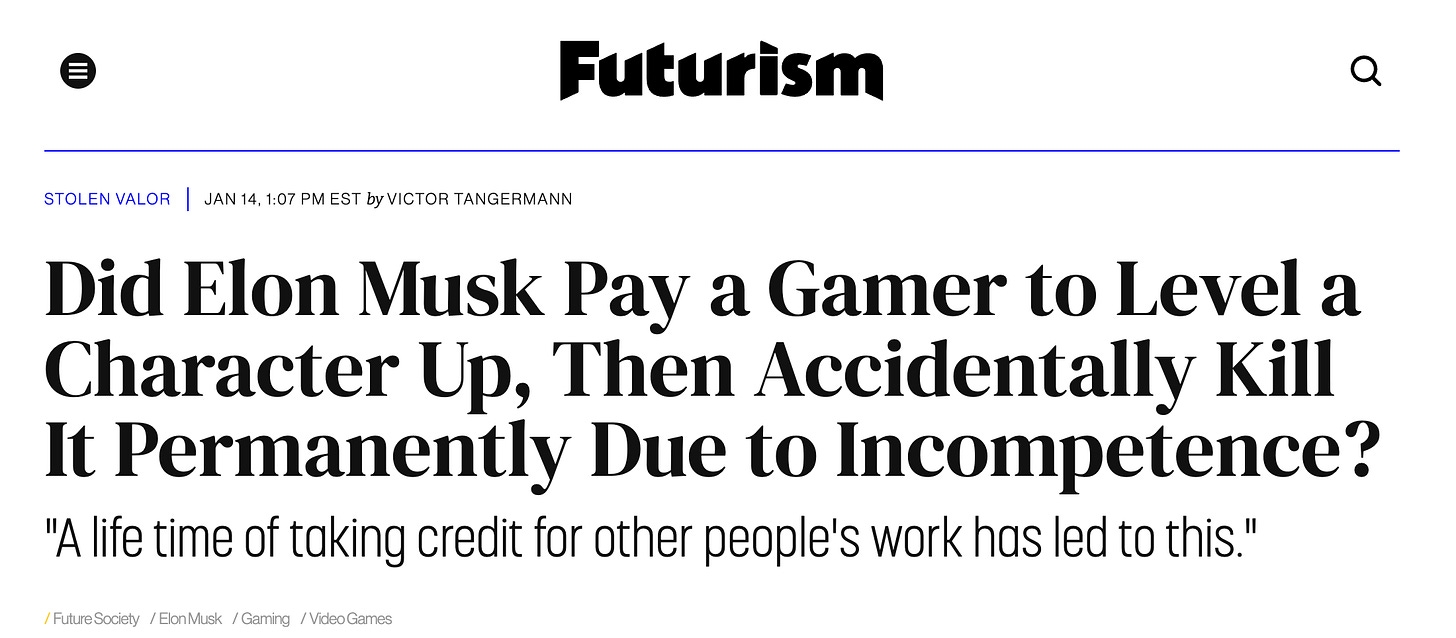
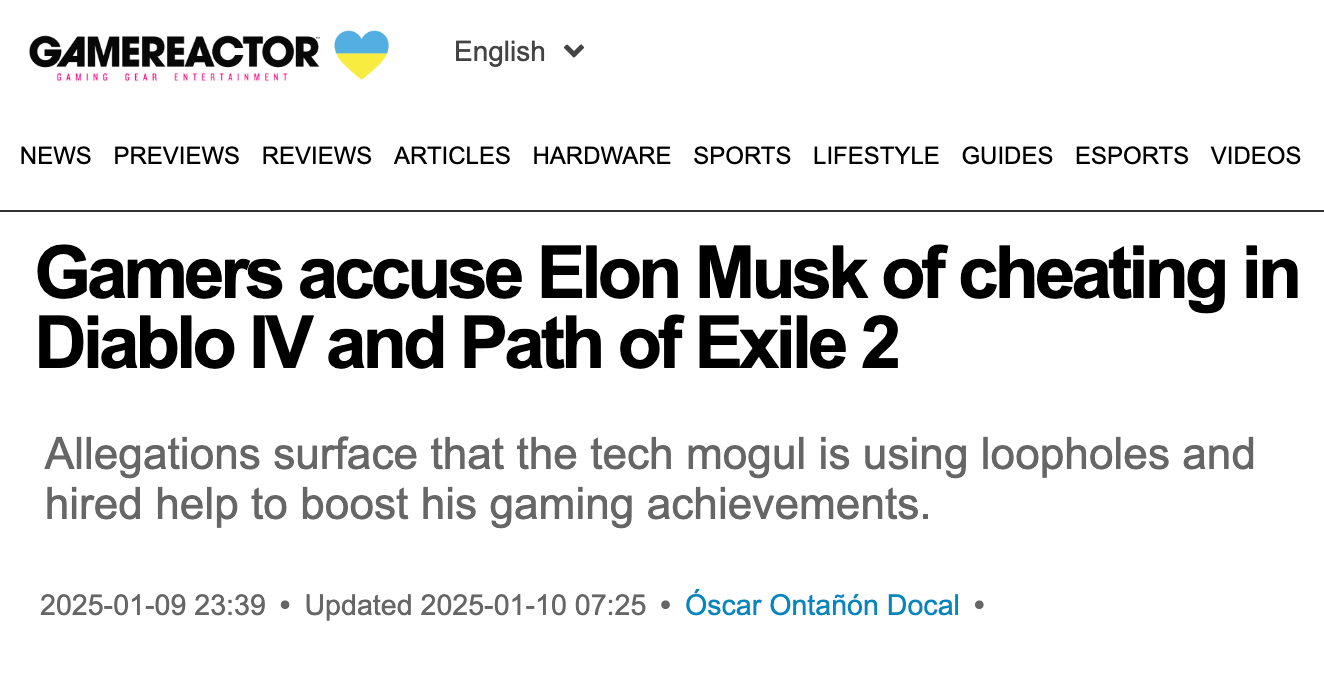
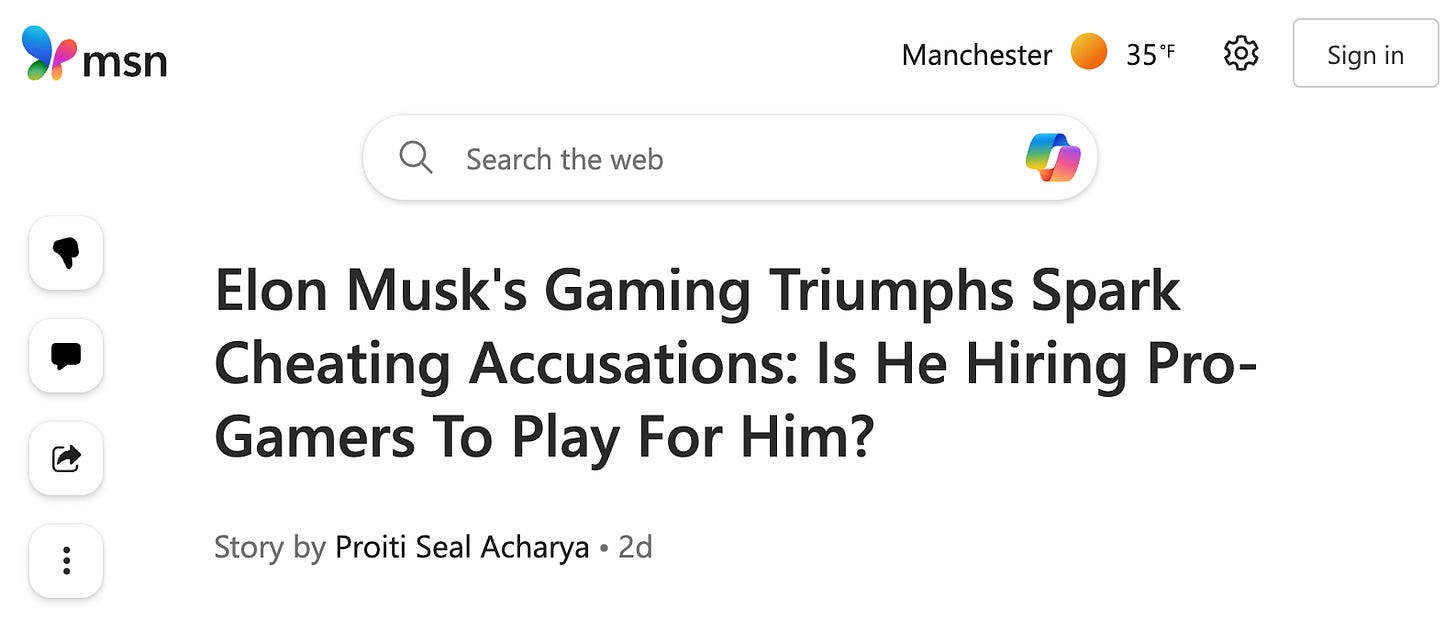
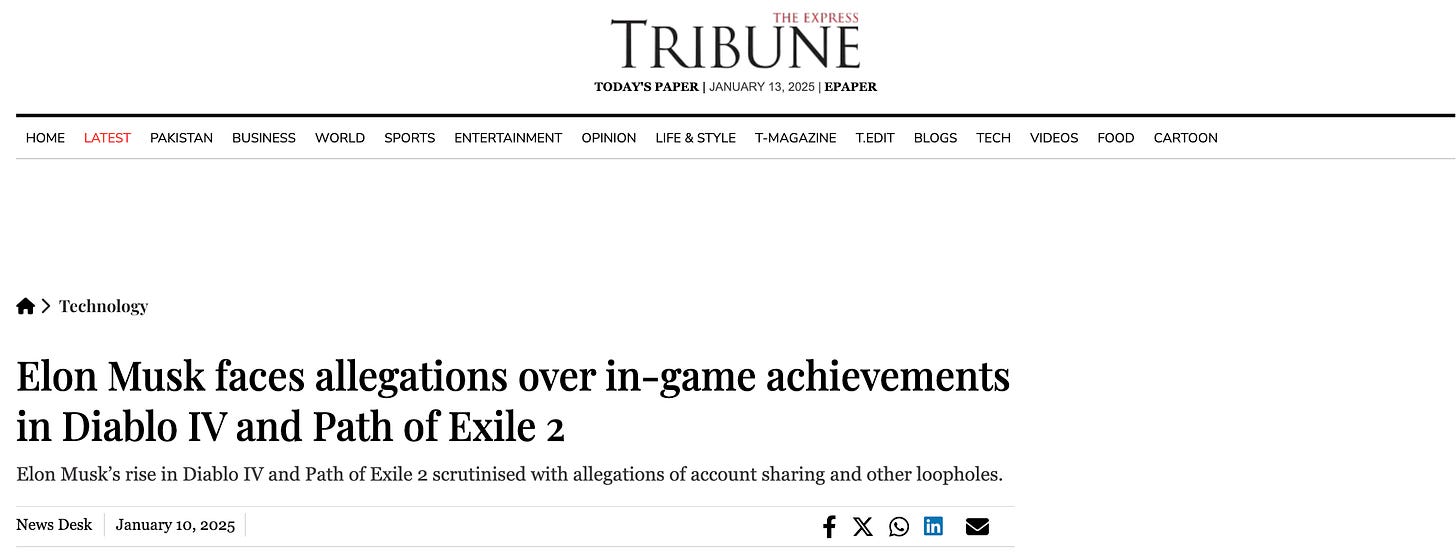
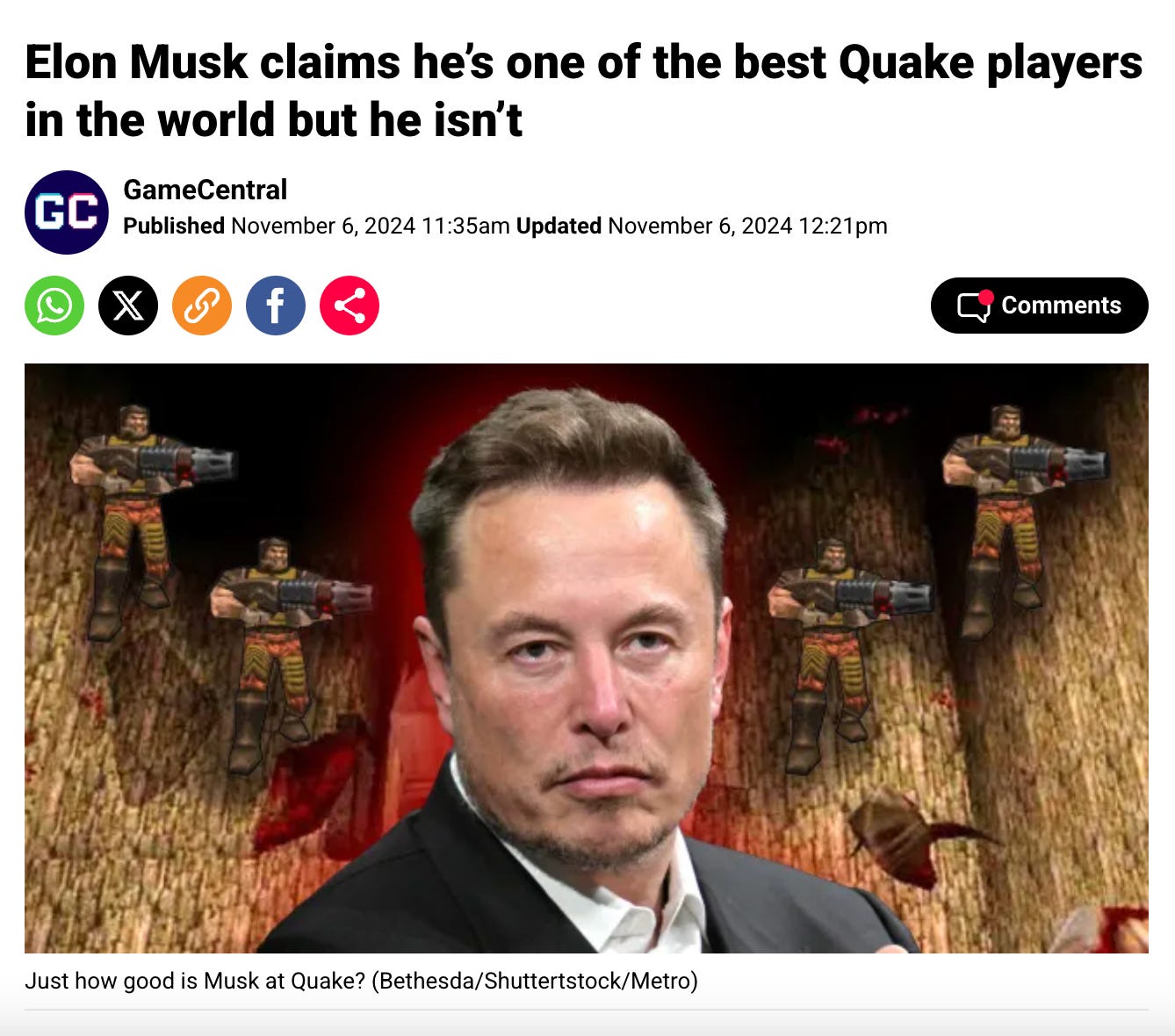
I'll say it again. Musk has left the real world and is living inside some malevolent mythical quest video game. Insanity happens. But when it happens to the worlds richest and most maniacal man, who also holds one of the most powerful positions in the world, we're f*cked.
I'm accusing him of more than that. And I'm accusing the Reagan Democrat leadership of getting two cowardly or complicit to do anything about it. Elon Musk and his brother are illegal immigrants who got away with it.
What Elon Musk Working Illegally Says About The Immigration System https://search.app/szRK6zmhX6bPN3R96
Melanie
immigration
EinsteinVisa
In 2001, future First Lady Grifter/alleged ESCORT Melania Trump received an exceptional ability green card for her work as a fashion model
"Melania Trump’s sketchy immigration history, explained - Vox" https://www.vox.com/platform/amp/2016/11/5/13533816/melania-trump-illegal-immigrant
"Melania Trump Got an “Einstein Visa.” Why Was It So Hard for This Nobel Prize Winner? – Mother Jones" https://www.motherjones.com/politics/2020/02/genius-green-card-visa-nobel-prize-trump/
The new fuhrers wife should have been thrown out of the country with her whole family. But again the Reagan Democrat establishment is either inept or complicit. Fair and balanced you decide.